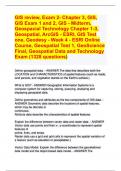Exam (elaborations)
GIS review, Exam 2- Chapter 3, GIS, GIS Exam 1 and 2, GIS - Midterm, Geospacial Technology Chapter 1-3, Geospatial, ArcGIS - ESRI, GIS Test one, Geodesy - Week 4 - ESRI Online Course, Geospatial Test 1, GeoScience Final, Geospatial Data and Technology Exa
- Course
- Institution
GIS review, Exam 2- Chapter 3, GIS, GIS Exam 1 and 2, GIS - Midterm, Geospacial Technology Chapter 1-3, Geospatial, ArcGIS - ESRI, GIS Test one, Geodesy - Week 4 - ESRI Online Course, Geospatial Test 1, GeoScience Final, Geospatial Data and Technology Exam (1328 questions)...
[Show more]



